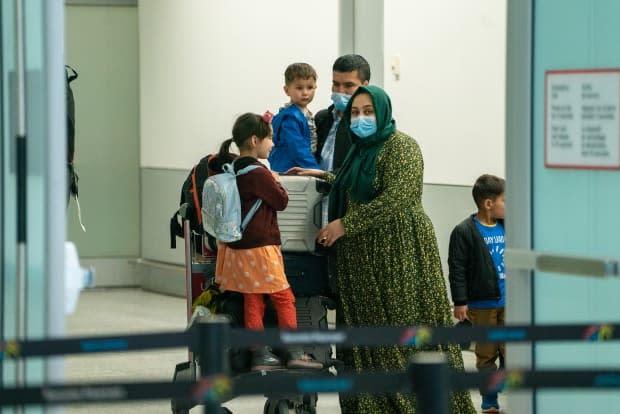Travelling while fully vaccinated: Your questions answered about the new rules coming July 5

Canadians eager to start travelling outside of the country again got a dose of hope this week when the federal government announced a plan to ease border restrictions next month. But the news still left many people with a lot of questions.
On Monday, Ottawa said fully vaccinated Canadians and permanent residents will be able to enter the country without having to quarantine beginning the night of July 5.
But there are conditions, including that incoming people must obtain negative COVID-19 tests both before and upon arrival, be asymptomatic and have a quarantine plan in the event a test comes up positive.
They also must electronically submit proof of full vaccination against COVID-19 — two doses of Government-of-Canada-approved vaccines received at least 14 days prior to arrival in the country — to the most recent version of the government's ArriveCAN app.
That last point prompted many people to ask the first of several questions we'll answer below.
What if I don't have a cell phone or smart phone?
If you can't access the ArriveCAN app on your phone, or you don't have a phone or one with data while travelling, there are alternatives for you.
The Public Health Agency of Canada (PHAC) says you can enter your information on the ArriveCAN website within the 72 hours before your planned arrival in Canada, and then print or take a screen shot of your receipt and bring it with you.
You can also ask a friend or a relative to enter your information on the website for you, then give you the print out or screen shot. You do not need to be travelling together. The ArriveCAN website is accessible for people with visual disabilities, PHAC said.
So, to be clear, while having a phone with the app is not crucial, if you don't provide the mandatory information on the ArriveCAN website before arriving, you will be required to quarantine for 14 days upon arrival and to provide a COVID-19 test result from the day you arrive as well as eight days after.
WATCH | Public Safety Minister Bill Blair talks about the ArriveCAN app:
What if I'm travelling with unvaccinated children?
There is not yet an approved vaccine in Canada for kids under 12. For now, if fully vaccinated parents are travelling with young kids, the government says the children will have to quarantine when they get home.
"Undoubtedly, this will be challenging for families who want to travel," Health Minister Patty Hajdu said during a briefing Monday.
"The advice from the team — that is scientists and public health experts — is that to protect Canadians from contact with an imported case of COVID-19, children under 12 do need to quarantine for the full 14 days."
There is no need for families with kids to stay at a quarantine hotel when they arrive back in Canada — the kids can go home with their parents to fulfil their quarantine.

What if my spouse is not Canadian? Do they have to quarantine?
The easing of the restrictions applies to all fully vaccinated Canadians, permanent residents and some foreign nationals who are eligible to enter Canada, according to Public Safety Minister, Bill Blair.
"It is the traveller's responsibility to plan ahead, to understand their obligations and to understand if they are eligible," Blair said.
Travellers can find out if they are eligible to enter Canada on the Government of Canada website. PHAC cautions that some provinces and territories have their own entry restrictions in place for travellers coming to Canada from another country, and that it is up to each individual to verify and follow any specific requirements.
WATCH | Blair explains who is eligible under the new eased restrictions:
Will Canada be issuing a vaccine passport?
Hadju said work is underway to create some kind of "proof of vaccination" that will be certified by the Canadian government.
"This work includes ongoing discussions with provinces and territories who have started issuing their own documents," Hajdu said.
WATCH | Hajdu talks about proof of vaccination and international travel:
What if I'm coming home before July 5? Can I have a shortened quarantine?
There is no special allowance for people returning to Canada before July 5, whether fully vaccinated or not.
Anyone arriving by air before that date will be required to follow all testing and quarantine rules, including the hotel stay while awaiting COVID-19 test results.
What if I can't get a vaccine for health reasons?
Since people who are unable to receive the vaccine — due to eligibility, allergies or other medical reasons — can be infected by COVID-19, they can also transmit the virus and its variants to others, PHAC pointed out.
"As a result, those who are currently unable to be fully vaccinated will be required to complete the day-8 [COVID-19] test (if they are over five years of age) and full 14-day quarantine," the agency said in an email.

What if I have mixed doses of vaccine? Or doses from different provinces?
In Canada, fully vaccinated is defined as having received two doses of a COVID-19 vaccine at least 14 days before arrival to Canada. The mixing of Canada's approved vaccines is accepted.
The four approved vaccines in Canada are:
Pfizer-BioNTech
Moderna
AstraZeneca-Oxford
Johnson & Johnson
You may have received two doses of the same vaccine, or a combination of two of them (for example, one dose of Pfizer plus one dose of Moderna, or one dose of AstraZeneca plus one dose of Pfizer or Moderna).
People who have received the Johnson & Johnson vaccine only need one shot.
It is okay if you received your first dose in one province and your second dose in another. You simply need to be able to provide the documentation that proves you are fully vaccinated according to Canadian criteria.

 Yahoo Movies
Yahoo Movies 